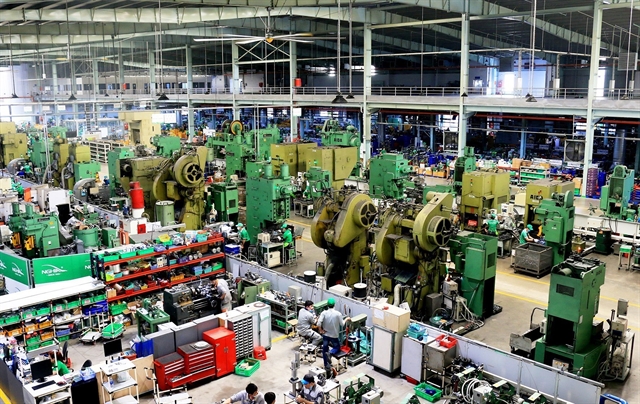For Việt Nam, this year could bring more difficulties than opportunities, as domestic businesses grapple with weak consumer purchasing power, declining business confidence and rising input costs.

HÀ NỘI — This year, institutional reform and robust business support are expected to be key to developing the business community in Việt Nam.
Experts predict that the global economy this year will continue to face significant uncertainty, with numerous risks and challenges ahead.
Countries are increasingly turning to trade protectionism and loosening monetary policies, creating further pressure on export-dependent businesses.
For Việt Nam, this year could bring more difficulties than opportunities, as domestic businesses grapple with weak consumer purchasing power, declining business confidence and rising input costs.
Businesses are facing heightened vulnerability, with their resilience significantly weakened, partly due to the unpredictable effects of natural disasters and climate change.
To enhance the development of private economic enterprises, the General Statistics Office highlights the importance of institutional reform and an improved investment environment.
One key recommendation is for the relevant ministries to finalise the legal framework for individual businesses. Recognising individual enterprises as part of Việt Nam’s private sector and incorporating this into the amended Law on Enterprises would help provide clearer support for these businesses.
Moreover, experts urge the Government to improve mechanisms for sharing business data between ministries, local authorities and the national database on business registration.
This shared information could help form policies that better promote socio-economic development, create a more favourable business investment environment and support business growth.
Removing institutional bottlenecks, along with addressing capital accessibility and suitable interest rates, are also top priorities for the business community in Việt Nam.
Businesses also emphasise the need for greater access to financing and policies on financial support for enterprises.
One of the most notable trends in the past year has been the strong shift towards a green and sustainable economy.
Investing in clean technologies and renewable energy is not only essential for meeting international emissions standards, but also opens up new business opportunities in demanding markets like the European Union (EU) and the United States.
However, this transition requires substantial investment and strong government support.
Trịnh Thị Ngân, head of the Advisory Board of the Hanoi Association of Small and Medium Enterprises, emphasised the critical role of financial support programmes for businesses transitioning to more sustainable technologies.
Changing equipment and production methods to meet international environmental standards requires significant upfront investment, so preferential interest rates could encourage businesses to innovate and reduce emissions.
Đỗ Thị Thúy Hường, a member of the Executive Committee of the Việt Nam Electronic Enterprises Association, echoed these sentiments, noting that without banking support, many businesses would struggle to make the necessary technological shifts.
She also highlighted the lack of leading companies in the technology sector, which had limited the development of a cohesive domestic supply chain.
Despite receiving some support from the Government and the State Bank of Việt Nam, experts argue that businesses still face significant challenges in accessing sufficient capital to recover and thrive.
Economic expert Dr Nguyễn Trí Hiếu explained that many businesses continued to struggle with bad debts, making them ineligible for further loans. As a result, several companies had been forced to exit the market due to a lack of financial resources to continue operations.
Dr Cấn Văn Lực, Chief Economist at BIDV, stressed the need to revise or replace Resolution 10 from 2017 on private economic development, as its implementation had not been as robust or effective as expected.
Furthermore, the Law on Support for Small and Medium-sized Enterprises (SMEs), enacted in 2017, includes provisions to reduce corporate income taxes for SMEs, but these provisions have yet to be fully realised. According to Lực, it is now critical to bring these provisions into practice.
Dr Phạm Xuân Hòe, former Deputy Director of the Banking Strategy Institute, proposed the establishment of a nationwide credit guarantee fund for SMEs.
While there are currently 28 regional SME credit guarantee funds in Việt Nam, they have not proven effective in providing the support needed to help businesses thrive.
Việt Nam in 2024 saw the registration of over 157,200 new businesses, with a total registered capital of over VNĐ1.5 trillion. These figures reflect a slight decline in both the number of new businesses (-1.4 per cent) and their registered capital (-1.8 per cent) compared to 2023.
Notably, the number of businesses returning to operations hit a record high of nearly 76,200, while the number of businesses withdrawing from the market surged by 14.7 per cent, totalling nearly 198,000 enterprises.
These statistics underline the fragility of Việt Nam's business ecosystem, with many enterprises struggling to stay afloat amid ongoing economic challenges. — VNS




